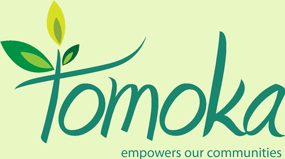
ABOUT US – GuKam
CONTENTS
- GuKam
- GuKam’s Mission
- GuKam’s Commitment
- GuKam’s Partnership for rural development
- GuKam’s Entrepreneurial scope
- GuKam’s Contributions to national development
- Strategic focus on Funding
- GuKam’s Core values
GuKam
GuKam is a small private enterprise in Togo, founded in 2008. We, the two owners of the Company, are using our own capital for the preparation, organization and starting-up of a hybrid form of the Jatropha System in Dawlotu Tutu, an extremely poor and deforested rural area where there is plenty of unused land available. Within this isolated region, we have created a Partnership with the local Population in the form of this TOMOKA Project. It aims at sustainable rural development and environmental rehabilitation. <Food & Bio-energy> production is its motor. The Project will assist 100 - 150 farmers selected by the local communities with their plans for the production of staple food crops and Jatropha seeds (for bio-energy) on new small farms of 5 hectares each. It also helps another group of 300 - 500 subsistence farmers with a program to plant Jatropha hedges around their properties, and to improve their agricultural production. All this has to result in considerable improvements of the living conditions of the total population of the Canton: a Target Group of about 21.000 people.
GuKam has also started up its own farming of Jatropha and staple food crops on a mid-size plantation of 250 - 550 hectares in the same area. With a view to maximizing crops for the Project, GuKam develops high quality Jatropha seeds on a Pilot Plantation near the hamlet of Avégamé, in the Centre of the Canton. There we also test several planting methods and other agricultural practices in an attempt to identify the most suitable ones for our Target Area
And last but not least: Gukam provides a Temporary Project Office to the Community in order to prepare and start up this joint development effort, and to get it financed
In the nearby future, the Canton and GuKam intend to operate small-scale agro-industries based on the local Jatropha and Food crops.
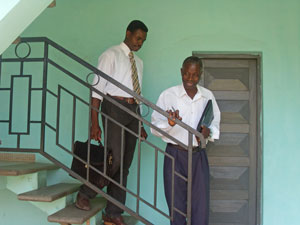 |
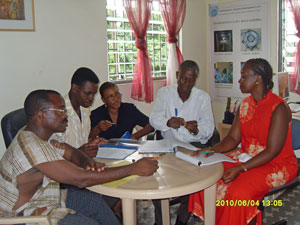 |
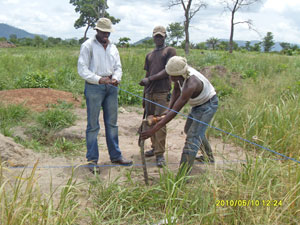 |
||
GuKam directors Gu-Konu (left) and Amégadzé leaving the Temporary Project Office which is housed in GuKam’s own office |
Temporary Project Team : Agric Officer Komi Apeli, Director Kodzo Gu-Konu, Accountant Nagan Amégadzé, Director Kodzo Amégadzé, Secretary Efua Namyalo Gu-Konu |
GuKam Director Gu-Konu & Plantation Manager Aloyi prepare the lay-out of Experimental Fields on the Pilot Plantation |
||
GuKam’s Mission
GuKam sees it as a self-imposed duty to create wealth responsibly within the most impoverished rural areas of our country. We seek to do this, as much as possible, within the context of the UN Millennium Development Goals (MDG). Our Project is conceived as an integrated contribution to MDG 1, 3 and 7. Respectively, they intend to 1) Eradicate Extreme Poverty and Hunger, 3) Promote Gender Equality and Empower Women, and 7) Ensure Environmental Sustainability. We explicitly try to link up the new TOMOKA Project to Policies and Efforts of our national government as presented in documents such as the National Strategy for the Eradication of Extreme Poverty.
Expressed in programmatic terms, Gukam will see to it that the TOMOKA Project will:
- promote sustainable rural development by using an environmentally friendly hybrid form of the Jatropha System (= Bio-energy & Staple Food production and assorted agro-industry)
- ensure food security and rural (bio)energy
- create many new jobs
- promote women empowerment
- empower local communities to take a leading role in planning and production processes
- support local communities with their administration and management
- stimulate local entrepreneurial skills
- provide major contributions to the replacement of petrol imports by home-grown bio-diesel
- contribute significantly to national development priorities as expressed in programs aiming at achieving of several UN Millennium Development Goals and to the national Food Security & enable the Government to sell CO2 emission rights.
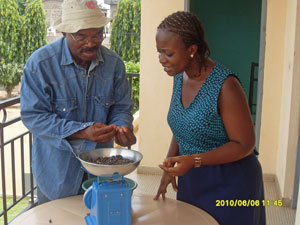 |
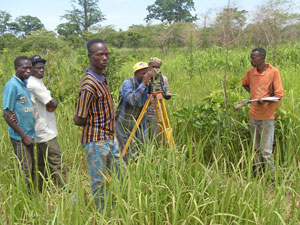 |
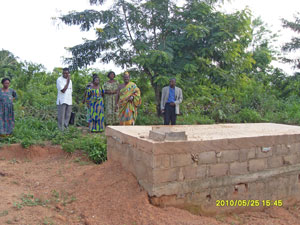 |
||
Agricultural Officer Apeli and Gukam secretary (temporarily assigned to Tomoka) weighing Jatropha Seeds (GuKam’s Office) |
Surveyors delimit the fields in the Canton for intercropping Staple Food with Jatropha |
Chief Togbui Kowou Akuagbi III & GuKam directors inspect the foundation of the first Public Latrine for the Canton |
||
GuKam’s Commitment
We are committed to launching and managing profitable, sustainable rural development projects which focus on bio-energy, food production and small-scale agro-industry in the poorest regions of Togo. Our Company focuses on capacity development through a partnership approach – in this first project with the population in the Canton of Dawlotu Tutu. It takes the form of integrating environmental conservation & livelihood activities that are building forward on the agricultural traditions, skills and knowledge of the rural communities. That is why we are introducing a hybrid form of the Jatropha System into this Canton where there is plenty of unused good lands available, over 6000 hectares. Armed with the lessons learned there, we intend to extend our activities to even poorer areas where semi arid conditions and marginal lands prevail – as is the case in the Kara Region.
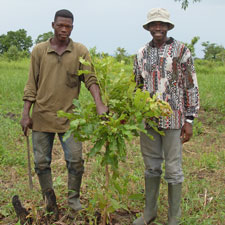 |
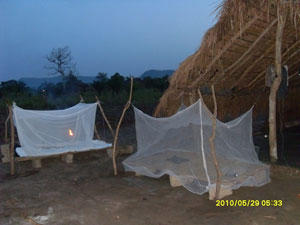 |
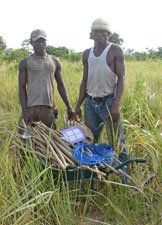 |
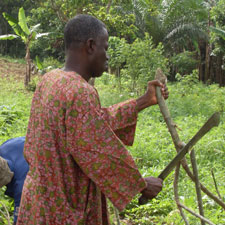 |
|||
Pilot Plantation Manager Mr Aloyi and GuKam director Kodzo Gu-Konu |
GuKam directors camp before their temporary office on the Pilot Plantation in Avégamé |
Plantation Manager (right) and assistant with Jatropha cuttings |
GuKam director Amégadze demonstrates cutting techniques |
|||
GuKam’s Partnership for Rural Development
GuKam is working in close partnership with isolated, rural communities; in this case with the population of the Canton of Dawlotu Tutu. Our Temporary Project Team intends to draw Experts, Investors, Banks and Donors to the Project area by liaising all TOMOKA-Initiatives to national and other development programmes which deal with such issues as poverty alleviation, agriculture, environmental rehabilitation, agro-industry and women empowerment. Considering the extreme poverty of TOMOKA’s thrust area and GuKam’s limited budget, we will first focus on cooperation with experts, donors and other supporters of rural development in our joint efforts to improve the quality of people’s life with the cultivation of Jatropha seeds (for bio-energy), food cash crops, and small scale agro-industries. In doing so, the interests of Private enterprise and the Community are equally served. Both GuKam and its rural partners will improve their incomes considerably. Moreover, the rural communities will benefit from that in many other ways, because their improved organization levels, administrative skills and earnings will increasingly contribute to better infrastructures, healthcare, education and other community oriented services.
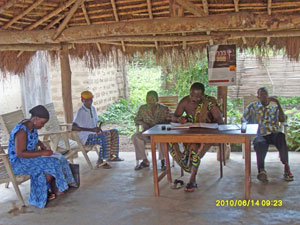 |
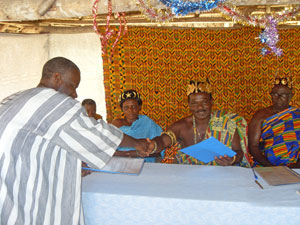 |
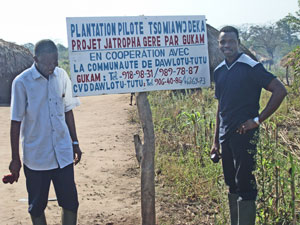 |
||
Members of the Village Development Committee (CVD) of Tutu, the Canton’s major village, and the Canton’s Superior Chief meet with GuKam secretary (left) |
Chief Togbui Kowou Akuagbi III and GuKam Director Amégadzé exchange the signed Agreements on cooperation (25 October 2009) |
GuKam directors Amégadzé and Gu-Konu (right) near the Pilot Plantation’s Signpost which specifies the cooperation with the Community |
||
GuKam’s entrepreneurial scope
GuKam concentrates its business practices on five interwoven domains in environmental rehabilitation, agriculture and rural agro-industry:
- the cultivation of Jatropha seeds – on 60% of the new unused, deforested land which will be exploited and rehabilitated by GuKam and the Rural Communities of the Canton of Dawlotu Tutu;
- the cultivation of Staple Food crops – on 40% of the new unused, deforested land which will be exploited and rehabilitated by GuKam and by the Rural Communities of the Canton of Dawlotu Tutu;
- the agro-industrial production of bio-energy by processing the Jatropha seeds produced by GuKam, local Farmers and Hedge Growers
- the agro-industrial production of baby food and other foodstuffs by processing locally produced staple food crops;
- the provision of managerial, liaison and administrative services to the Rural Communities in the Canton of Dawlotu Tutu while being a member of TOMOKA’s Steering Committee (abbreviated as CVD-P).
GuKam is preparing itself to becoming a bio-fuel feedstock company that produces about half of the Jatropha crops, while small-scale farmers of the Canton provide the other fifty percent. Moreover, GuKam will purchase the Jatropha seeds to be harvested by the Hedge Growers in the Canton.
We intend to produce most of the Jatropha oil ourselves. However, the future agro-industries which will process this pure plant oil may be owned by us and/or by local entrepreneurs. Most of the Jatropha oil will be used for the production of bio-fuel to be used in trucks, cars, and industrial machines. A smaller quantity of Jatropha oil will be used to make competitive, high quality soaps. But it will also be marketed in rural and urban areas with the intention to replace charcoal and petroleum-based products for light and cooking at affordable prices. Moreover, this oil can be used in generators to produce electricity for local mechanization needs during the day and for lightning at night – as is the case with the multifunctional platforms in Mali. Residues of the Oil Press (press cake and sediments) will be turned into briquettes and fertilizers or they will provide biogas.
The increased production of such staple food cash crops as maize, beans, onions, groundnuts and soy will mostly take place in the form of intercropping with Jatropha. An important part of the crops will find its way to small agro-industries which will be founded in the Project’s rural areas. The local crops will be turned into products like baby and children food which is likely to contribute significantly to fighting the wide spread malnourishment problems of our children. 26,6% of Togo’s children under five years are malnourished. More than 1/3 of them (7%) are even classified as “severely malnourished”, and 123 out of 1000 children die before they reached their 5th birthday.
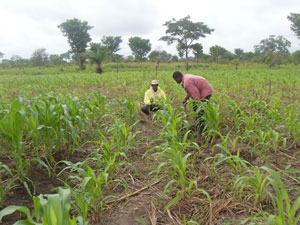 |
 |
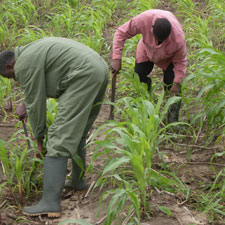 |
||
GuKam director Gu-Konu & Pilot Plantation Manager check an Experimental Maize field |
Administrative support by GuKam’s director Mr Amégadzé |
Directors take turns for the Field Inspections. Here Mr Amégadzé (left) with Mr Aloyi (Manager of Pilot Plantation) |
||
Article 5 of the Cooperation Agreement between GuKam and the Canton of Dawlotu Tutu urges GuKam to provide liaison and administrative services to all kinds of social, cultural and economic Initiatives of the rural communities in the Canton of Dawlotu Tutu. Therefore GuKam has set up an administrative and managerial facility for the Project’s Steering Committee (CVD-P): the Temporary Project Office. All policies and implementations of Community Projects and the introduction of the <Jatropha & Food Production> scheme are being prepared here. By employing and training local staff, the administrative and managerial competences will increase significantly. In GuKam’s view this is the most effective way of guaranteeing the Project’s sustainability.
The surplus value generated in the above ways has a unique character: almost all of it stays within the rural area itself! It is an important impetus for all kinds of secondary rural development processes.
GuKam’s Contributions to national development
In addition to what has been said about our role in the TOMOKA Project which aims at improving the quality of life by accelerating rural development, GuKam makes it clear that we are the first and only promoters of the Jatropha System in Togo. We are building a leading position as a provider of high quality Jatropha Seeds, Pure Plant Oil, and Bio-fuel which increasingly will replace the expensive imports of petroleum-based fuel for Togo’s Transport and Energy (electricity) sectors. We are doing this commercially but responsibly by fighting deforestation, cultivating only on unused land, and insisting on intercropping with food and on women participation. We are teaming up with our partners, the Local Rural Communities of the Canton, on all levels of the Project: in the planning and production process, by stimulating entrepreneurial roles, by providing support with managerial, administrative and liaison services, and by the creation of a maximum of new jobs — mostly on small, new farms and in new agro-industrial processing units which will create important surplus values which will boost local economy even more.
By using the Jatropha System as a major ”motor of a sustainable, integrated rural development process” our nation will benefit as a whole. The combination of Jatropha & Food production will contribute significantly to food security and energy-independence and to the national and regional treasury via fair taxations. Moreover, the national government will benefit directly and indirectly from the income which Local Development Organizations like Tomoka will partly finance themselves when they sell CO2-emission rights on the international markets.
At the macro-economic level GuKam points to the many gains of this Project: increased rural incomes, savings on foreign imports, improved sustainability of Togo’s environment & ways of generating income, Togo’s growing income from taxation, and the revenues from sales of CO2 emission rights which will provide substantial increases of the national private investments into rural development. This will enable our government to spend more of its own budget on infrastructure and other development priorities.
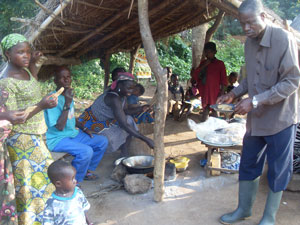 |
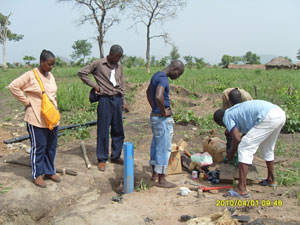 |
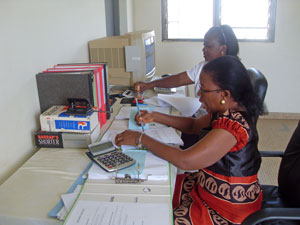 |
||
Director Amégadzé (right) takes lunch with a local family next to the Pilot Plantation |
The first Water Borehole in Avégame. GuKam’s secretary Mrs Namyalo (with yellow bag) and GuKam director Amégadzé inspect progress |
GuKam Accountant (front) and Secretary at work in Tomoka’s Temporary Project Office in GuKam’s own building |
||
Strategic focus on Funding and Expertise
We explicitly state that we have plenty of energy, perseverance, skills, workable ideas, concrete results and effective contacts. But we do not have cash. That is why we help the TOMOKA Project in its efforts to attract financing and other support from external sources, trying to convince them with the concrete starting-up achievements in the rural area concerned.
From this moment onwards, GuKam seeks for itself and its rural partners in the TOMOKA Project sufficient funding and backing by highly qualified experts in Jatropha Cultivation and Processing, Agronomy, sustainable environmental conservation, small-scale agro-industries, and (rural) community development processes. Wherever possible, we will cooperate as much as possible with existing Non-Governmental Organizations (NGOs) and National Development Programmes.
GuKam’s Core values
At GuKam, we are committed to strategies, organisation forms and work methods that have proven to be successful in our own project area – not on wishful thinking and inflated assumptions about fast, enormous crops and smooth participation of extremely poor farmer populations. In this we are guided by seven core values:
- Partnership in all our activities
- Hard work and perseverance
- Recognition of local capacity – with special attention to the position of women
- Transparency and Accountability – with clear distinctions of tasks and roles
- Ecological and environmental conservation
- Patience
- Commitment to optimal – not maximum -- profits and benefits for ourselves and our partners.
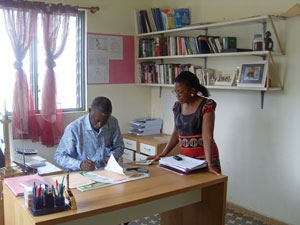 |
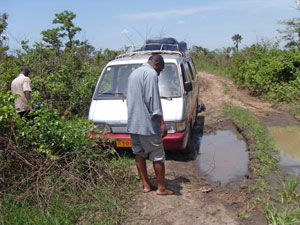 |
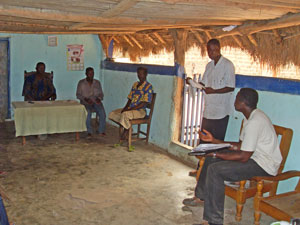 |
||
GuKam’s Director and Accountant at work in Tomoka’s Temporary Office (housed in GuKam´s own building in Lomé) |
Close to the Project Site in Avégamé where the upkeep of rural roads is a real problem |
GuKam Directors (right) present a proposal to the Village Chief Togbui Dzéto |
||
 Français
Français